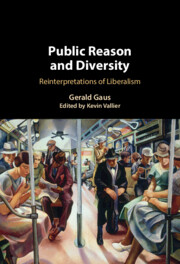Book contents
- Public Reason and Diversity
- Public Reason and Diversity
- Copyright page
- Contents
- Figures
- Tables
- A Note on the Essays
- Introduction
- Part I Liberalism
- Part II Diverse Public Reason
- Chapter 6 A Tale of Two Sets
- Chapter 7 Self-Organizing Moral Systems
- Chapter 8 Political Philosophy as the Study of Complex Normative Systems
- Index
Chapter 6 - A Tale of Two Sets
Public Reason in Equilibrium
from Part II - Diverse Public Reason
Published online by Cambridge University Press: 18 October 2022
- Public Reason and Diversity
- Public Reason and Diversity
- Copyright page
- Contents
- Figures
- Tables
- A Note on the Essays
- Introduction
- Part I Liberalism
- Part II Diverse Public Reason
- Chapter 6 A Tale of Two Sets
- Chapter 7 Self-Organizing Moral Systems
- Chapter 8 Political Philosophy as the Study of Complex Normative Systems
- Index
Summary
Public reason liberalism is a family of theories according to which liberal political institutions, social structures, and/or basic social rules are politically or morally justified if and only if they can be endorsed from the perspective of each and every free and equal “reasonable and rational” person. Let us call these persons “the members of the justificatory public.” Public reason liberalism idealizes the members of the justificatory public in three senses. First, the members of the justificatory public are assumed to be free from at least some of the cognitive distortions and biases that often characterize actual people; we suppose that they generally reason in a sound way on the basis of relevant information. Different versions of public reason liberalism press this idealization quite far, while others insist on a “moderate idealization.” Secondly, the members of the justificatory public are idealized insofar as it is assumed that each is a good-willed person, concerned with living with others on terms that are mutually acceptable. In Rawls’s language, we suppose that they are not simply rational, but “reasonable”: they have a form of “moral sensibility” according to which they are ready to propose fair terms of cooperation, and are willing to abide by them “provided others can be relied on to do likewise.” The members of the justificatory public are thus idealized insofar as they are assumed to be moved by their sense of justice, or their aim to respect others as free and equal persons. This leads to a third idealization: by assuming that the members of the justificatory public are moved by this moral sensibility, it is supposed that they do not pay attention to their reasons to ignore their sense of justice (or, we might say, defect on moral arrangements when doing so better advances their cherished ends, aims, and projects). More generally, any specific version of public reason liberalism will hold that some reasons of actual people are not relevant to the justificatory question: the members of the justificatory public “bracket” (i.e., set aside) these reasons in their deliberations.
- Type
- Chapter
- Information
- Public Reason and DiversityReinterpretations of Liberalism, pp. 179 - 201Publisher: Cambridge University PressPrint publication year: 2022



